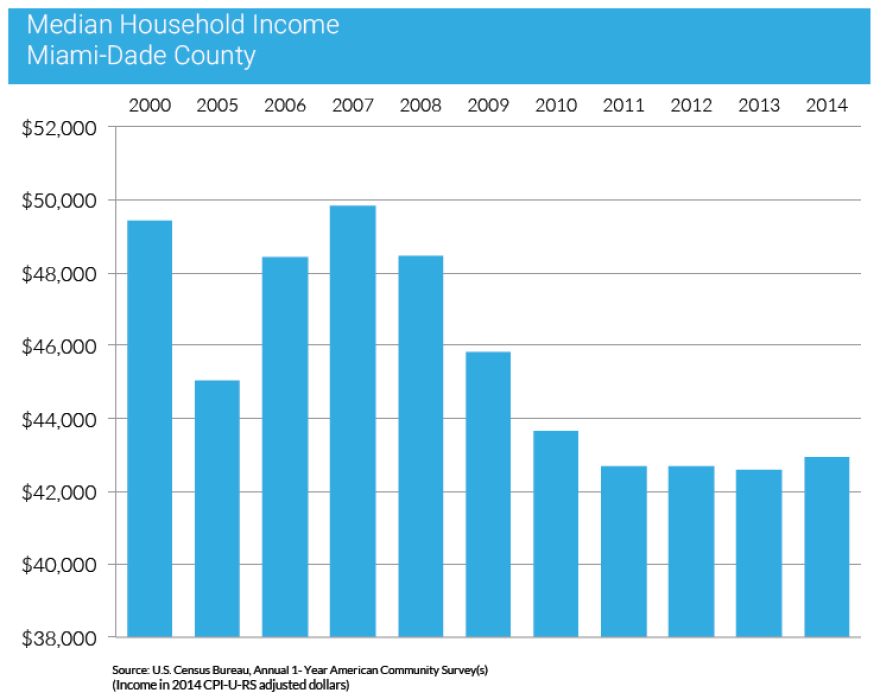
Poverty is up in Miami-Dade County and wages are about the same as they were back in 2010 when adjusted for inflation.
Those are just a few of the findings of a new comprehensive study of prosperity in the county coming out Wednesday from the Florida International University Metropolitan Center that paints a picture of the region that in many ways looks worse than during the height of the last recession.
Prompted by the county’s Council for Prosperity Initiatives, the center identified four pillars that would flesh out what it means to talk about prosperity in South Florida: stability, opportunity, mobility and equity. The economic prosperity index makes up the research core of the "Miami-Dade County Prosperity Initiatives Feasibility Study."

“When we’re defining prosperity, it’s an elusive concept,” said Kevin Greiner, one of the authors of the study. “The key for us… is a focus on opportunity and mobility. The idea that you have a range of jobs, you have some choices in jobs and that if through your own effort, working hard you can climb the economic ladder. And when we boiled it all down, the region really is lagging behind its competitors.”
And lagging behind its competitors, according to the study, isn’t just an issue of hurt pride but a very real concern about the future of this community. There’s been a considerable amount of research by the Brookings Institute and other policy research groups that for a city to have a high prosperity level is not just beneficial to people at the lower end of the spectrum but also has a marked impact on the incomes and economic well being of people at the higher ends of the income spectrum.
“There’s the moral argument, of course,” said Ned Murray, another author of the study, whose findings echoed these national studies. “But more important, there is this larger imperative in terms of a sustainable economies and making economies competitive, not only nationally but globally.”

Sustainability, or stability is something Miami-Dade County is particularly hurting for. It’s this metric that makes recessions hurt more and last longer.
“[Miami-Dade County] relies on its success, but like a lot of places it eventually becomes a victim of its own success,” said Greiner. “It’s so successful at real estate, tourism… those elements of its economy become a structure that dominate the regional economy”
And those jobs are generally lower-paying. The engines of other cities’ economies like Seattle or San Francisco are built to support higher-paying jobs. So in the wake of the recession, Miami-Dade County is doing worse than the national averages on things like the county’s poverty, 19.8 percent, which is 33 percent higher than the national poverty rate. Also, the county’s 2014 median household income, $42,926 adjusted for inflation, is 11.8 percent less than it was in 2000, which is 45 percent more than the national average. And finally, the Miami metro area’s productivity is the lowest of any comparable areas.
We may be at a tipping point. --Kevin Greiner, co-author of "Miami-Dade County Prosperity Initiatives Feasibility Study"
“If Miami-Dade wants to become the economy that we all talk about: higher tech, higher paying jobs,” says Greiner, “collectively our institutions, our leadership have to triple and quadruple their efforts to start moving it in that direction. We may be at a tipping point.”
Running various numbers through the models the Metropolitan Center devised showed that if the county could somehow raise the incomes of up to 27,000 households to the median area income, $43,100, not only would that increase tax revenue but it also would increase the number of higher-wage jobs, “trickle up” if you will. Those jobs would be created in industries including securities and investments, offices of health practitioners and home health-care services.

Using this, this study attempts to provide a light at the end of the tunnel. The study evaluated five types of programs on their effectiveness to bring about some change in the region’s future prosperity, what the study calls its Prosperity Initiative. The two-year pilot program would seed the five programs with a combined investment of $9.6 to $10.2 million with a project impact of 2,310 households.
Among the programs are a suggested $4.3 million investment in social enterprise incubators and accelerators, $3.3 million in community land trusts and $550,000 in children’s savings accounts.
Getting these five initiative funded and off the ground is a focus of the FIU Metropolitan Center going forward and a major component of its rollout of the study Wednesday.





